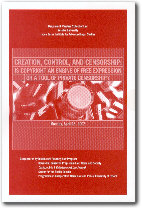| |
conferences
|

|
CREATION,
CONTROL, AND CENSORSHIP: THE FREE ENGINE OF EXPRESSION OR A TOOL
OF PRIVATE CENSORSHIP?
Benjamin
N. Cardozo
School
of Law
Yeshiva
University
April
15, 2002
|
DESCRIPTION
In
the United States Supreme Court decision of Harper & Row,
Publishers, Inc. v. Nation Enterprises, Justice O’Connor reminded
us that the Framers intended copyright to be “an engine of free
expression.” In recent years, however, some organizations—such
as those in the media industries and religious organizations—have used
copyright as a tool to influence and censor ideas and to suppress
dissent.
This
symposium seeks to examine this important issue by bringing together
noted legal scholars, practitioners, industry people, and computer
specialists. In particular, the symposium explores the use of
copyright by the media industries and religious organizations and how to
use technology, computer codes, and technical rules to promote the free
flow of ideas.
SCHEDULE
|
8:30 |
Continental
Breakfast
|
|
9:00 |
Welcoming
Remarks
Dean
David Rudenstine, Benjamin N. Cardozo School of Law, Yeshiva
University
|
|
9:15 |
Copyright
and the Media Industries
Moderator:
-
Prof.
Monroe E. Price, Benjamin N. Cardozo School of Law, Yeshiva
University & Co-Director, Programme in Comparative Media
Law & Policy, University of Oxford
Speakers:
-
Prof.
Ronald Bettig, Penn State University
-
Prof.
Eric Easton, University of Baltimore School of Law
-
Mike
Godwin, Policy Fellow, Center for Democracy and Technology
-
Prof.
David Korzenik, Benjamin N. Cardozo School of Law, Yeshiva
University
-
George
Vradenburg, Advisor to the Chairman, AOL Time Warner, Inc.
|
|
11:15 |
Coffee
Break
|
|
11:30 |
Codes,
Technology, and Dissent
Moderator:
-
Prof.
Peter K. Yu, Benjamin N. Cardozo School of Law, Yeshiva
University & Research Associate, Programme in Comparative
Media Law & Policy, University of Oxford
Speakers:
-
Prof.
Yochai Benkler, New York University School of Law
-
Prof.
Julie E. Cohen, Georgetown University Law Center
-
Matthew
Oppenheim, Esq., Senior Vice President (Legal and Business
Affairs), Recording Industry Association of America, Inc.
-
Prof.
Pamela Samuelson, Boalt Hall School of Law, University of
California at Berkeley
-
Richard
Stallman, Founder and President, Free Software Foundation
-
Prof.
Siva Vaidhyanathan, School of Library and Information Studies,
University of Wisconsin-Madison
|
|
1:30 |
Lunch
|
|
3:00 |
Copyright,
Religion, and the Separation of Church and State
Moderator:
Speakers:
-
Prof.
Thomas C. Berg, University of St. Thomas Law School
-
Prof.
Thomas F. Cotter, Frederic G. Levin College of Law, University
of Florida
-
Mark
B. Helm, Esq., Partner, Munger Tolles & Olson, LLP, Los
Angeles
-
Prof.
Eugene Volokh, UCLA School of Law
Commentators:
-
Prof.
Marci A. Hamilton, Benjamin N. Cardozo School of Law, Yeshiva
University
-
Prof.
William P. Marshall, University of North Carolina School of
Law
|
|
5:00 |
Reception |
SYMPOSIUM
AND OTHER PUBLICATIONS
Thomas
F. Cotter, Gutenberg's Legacy: Copyright, Censorship, and
Religious Pluralism, 91 Cal. L. Rev. 323 (2003)
Thomas
F. Cotter, Accommodating the Unauthorized Use of Copyrighted Works
for Religious Purposes Under the Fair Use Doctrine and Copyright Act
110(3), 22 Cardozo Arts & Ent. L.J. 43 (2004)
|
|
